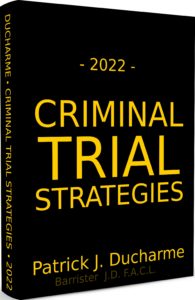Uncovering all the facts requires more than meetings with your own client and the client’s witnesses. Complete disclosure is paramount, although the issue of what can or should be disclosed in any given case is by no means uncontroversial.
The right of the accused to full disclosure by the Crown is an adjunct of the right to make full answer and defence. One important source of information, of course, is that information in the possession of the Crown. The term “in the possession of the Crown” is now understood to include all information in the possession or knowledge of the police. In 1991, Justice Sopinka, writing for a unanimous court in R v. Stinchcombe, reviewed the general principles governing the duty of the Crown to make disclosure to the defence, especially in the context of indictable offences. He concluded that the Crown’s general obligation is to disclose all relevant information, even if the Crown does not propose to adduce it at trial. His Lordship also noted, however, that the Crown’s obligation is not absolute. It is subject to the Crown’s discretion, a discretion extending both to the withholding of information and to the timing of disclosure.
Stinchcombe thus appears to stand for the proposition that the Crown has an obligation, before the accused is called upon to elect a mode of trial or plead, to disclose to the defence all information, unless the information:
- Is privileged, as, for example, in the case of informers whose identity the Crown is obliged to protect;
- Is clearly irrelevant, the point being that the Crown ought to err on the side of inclusion; or
- Would, if disclosed, impede completion of an investigation.
When an issue arises with respect to the exercise of the Crown’s discretion, defence counsel should seek the intervention of the trial Judge at the earliest opportunity. “Failure to do so by counsel for the defence,” said Sopinka J., “will be an important factor in determining on appeal whether a new trial should be ordered.”
The general principles enunciated in Stinchcombe were then elaborated upon in the January 1993 report of the Attorney General’s Advisory Committee on Charge Screening, Disclosure and Resolutions chaired by the Honourable G. Arthur Martin.
According to the Advisory Committee, the trial Judge reviewing the Crown’s disclosure decision should be guided by the general principle that information ought not to be withheld if there is a reasonable possibility that the withholding of information will impair the right of the accused to make full answer and defence.
All witnesses for the prosecution and the defence are potential sources of information and may prove valuable to defence counsel. It has long been settled that there is no property in a witness and that a witness may be interviewed by both sides.
Of course, a lawyer wants to avoid the possibility of unwittingly becoming a witness and should therefore ideally have all witnesses interviewed by someone else, preferably an independent private investigator who may be called in the event that the witness later gives evidence inconsistent with any statement earlier provided. The importance of preserving in some independent fashion the previous oral and written statements of witnesses is highlighted by the various uses that may be made of previous statements under sections 9, 10, and 11 of the Canada Evidence Act.
If it is not possible to use an investigator, provide at the very least to have a third party present, particularly when interviewing witnesses who are expected to testify for the prosecution. In this situation, you should be forthright with the witness, indicating that you represent the accused and that the witness need not speak to you if she or he chooses not to. Tell the witness that, in fact, neither side has ownership or property rights to the witnesses and that they are free to speak to whomever they choose.
To the indefatigable among us, sources of information potentially valuable for trial are almost limitless. My own experience has been that many people are quite willing to share information they have without even being required to do so by subpoena. For example, people who work in weather stations are usually most willing to provide oral and written information about particular weather and road conditions, wind velocity, and so on, whenever they are asked. They can also provide precise times for sunrise and sunset, useful information when visibility conditions are relevant.
Municipal offices, too, are often willing to provide information about such things as traffic lights, traffic conditions, accidents, occurrences or related data, road conditions and road repair. Coroners and forensic pathologists are also usually cooperative in disclosing, upon request, information about investigations and autopsies. If they fail to respond to a request by the defence lawyer alone, they will provide the information when the request is made with the consent of the prosecutor. The same may generally be said for ambulance services, fire departments, and accident reconstruction services.
Section 12 of the Canada Evidence Act permits counsel to question any witness about previous convictions, and if the witness denies the fact of a previous conviction or refuses to answer, this section permits counsel to prove the conviction. The criminal record of any potential witness, if not supplied by the prosecution as part of its disclosure, can generally be obtained by a duces tecum subpoena to the custodian of the records of any local police department, R.C.M.P. office or Ontario Provincial Police office. Usually all that is required to obtain the criminal record is the proper spelling of the witness’s name and a date of birth or approximate age.
The above is the an excerpt of Criminal Trial Strategies, available at Amazon or in bulk through MedicaLegal Publishing.
Read or listen to the Preface and Introduction and subscribe to Patrick Ducharme’s Youtube Channel.

